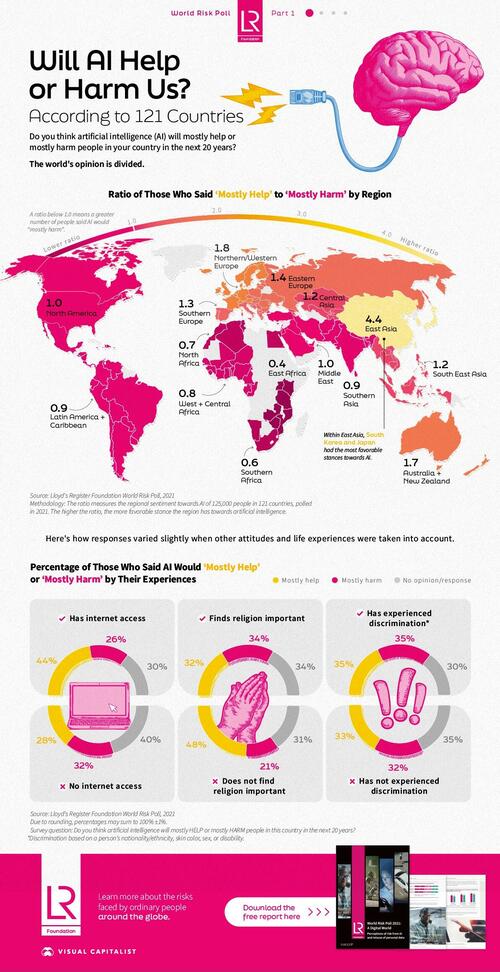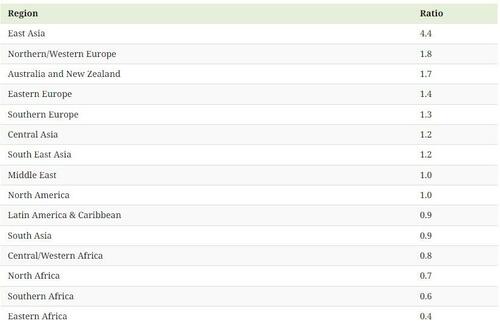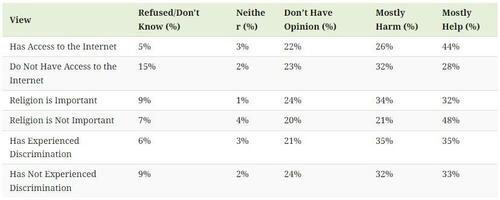
Artificial intelligence (AI) has become a revolutionary force with the potential to transform many aspects of our daily lives.
So understanding how the average person feels about this technology is essential as it integrates further into society.
In the graphic below, Visual Capitalist's Alan Kennedy and Sabrina Fortin, using data from Lloyd’s Register Foundation, we explore the findings of the World Risk Poll 2021: A Digital World.
The World’s Opinion is Divided
In the poll, which had 125,000 respondents in 121 countries, people were asked if AI would ‘mostly help’ or it would ‘mostly hurt‘ people in their home country over the next 20 years.
We’ve looked at the ratio of these responses below.
A higher ratio above 1.0 indicates that more people think AI could ‘mostly help’, while a ratio below 1.0 suggests that the population has more skepticism towards the technology.
Globally, the average ratio is 1.4, but significant differences can be seen when looking at each individual region.
Notably, public opinion among the biggest economies appears split.
When we dug into the data, we saw that the U.S. showed skepticism towards AI with a ratio of 0.9. In this case, the potential loss of jobs could possibly be the leading cause of apprehension.
On the other hand, China expressed a ratio of 4.5, meaning for every 1 respondent that believes AI will ‘mostly harm’, 4.5 said AI would ‘mostly help’.
Why is AI So Polarizing?
AI has always been a divisive subject, and even the media can’t settle on whether AI is akin to the chaotic and malevolent Ultron or the caring and cat-obsessed Lt. Cmdr Data.
Consequently, it’s not just a person’s nationality or media consumption that impacts their stance on AI. A person’s life experience may also play a role in their perception of AI, more notably when it comes to religious views or access to the internet:
Artificial intelligence has many philosophical ramifications, so it’s no surprise that only 32% of those who consider religion important believe AI will help. Conversely, 48% of non-religious people believe AI will ‘mostly help’.
In 16 countries, the percentage of people who say AI will ‘mostly harm’ was higher among those who had experienced discrimination based on their race/nationality, skin color, or sex, compared to those who had not. Notably, these include three Northern European countries where overall perceptions of AI are among the most positive in the world: Norway, Denmark, and Sweden.
An Uncertain Future
Even though 39% of global respondents believe AI will ‘mostly help’ in the next 20 years, only 27% of those people believe they would feel comfortable behind the wheel of a self-driving car. This suggests that while people may be ready for AI as a tool, they may not be ready for it to control large parts of their life.
With this in mind, understanding public opinion is crucial for policymakers and industry leaders to then shape the development and deployment of AI technologies in a manner that addresses these concerns.
Lloyd’s Register Foundation has created the World Risk Poll 2021 to help engineer a safer world, but the scope of this study goes beyond AI and personal data. In part two of this series, we’ll explore the World Risk Poll 2021: Safe At Work and unearth some startling trends regarding workplace harassment.
Artificial intelligence (AI) has become a revolutionary force with the potential to transform many aspects of our daily lives.
So understanding how the average person feels about this technology is essential as it integrates further into society.
In the graphic below, Visual Capitalist’s Alan Kennedy and Sabrina Fortin, using data from Lloyd’s Register Foundation, we explore the findings of the World Risk Poll 2021: A Digital World.
The World’s Opinion is Divided
In the poll, which had 125,000 respondents in 121 countries, people were asked if AI would ‘mostly help’ or it would ‘mostly hurt‘ people in their home country over the next 20 years.
We’ve looked at the ratio of these responses below.
A higher ratio above 1.0 indicates that more people think AI could ‘mostly help’, while a ratio below 1.0 suggests that the population has more skepticism towards the technology.
Globally, the average ratio is 1.4, but significant differences can be seen when looking at each individual region.
Notably, public opinion among the biggest economies appears split.
When we dug into the data, we saw that the U.S. showed skepticism towards AI with a ratio of 0.9. In this case, the potential loss of jobs could possibly be the leading cause of apprehension.
On the other hand, China expressed a ratio of 4.5, meaning for every 1 respondent that believes AI will ‘mostly harm’, 4.5 said AI would ‘mostly help’.
Why is AI So Polarizing?
AI has always been a divisive subject, and even the media can’t settle on whether AI is akin to the chaotic and malevolent Ultron or the caring and cat-obsessed Lt. Cmdr Data.
Consequently, it’s not just a person’s nationality or media consumption that impacts their stance on AI. A person’s life experience may also play a role in their perception of AI, more notably when it comes to religious views or access to the internet:
Artificial intelligence has many philosophical ramifications, so it’s no surprise that only 32% of those who consider religion important believe AI will help. Conversely, 48% of non-religious people believe AI will ‘mostly help’.
In 16 countries, the percentage of people who say AI will ‘mostly harm’ was higher among those who had experienced discrimination based on their race/nationality, skin color, or sex, compared to those who had not. Notably, these include three Northern European countries where overall perceptions of AI are among the most positive in the world: Norway, Denmark, and Sweden.
An Uncertain Future
Even though 39% of global respondents believe AI will ‘mostly help’ in the next 20 years, only 27% of those people believe they would feel comfortable behind the wheel of a self-driving car. This suggests that while people may be ready for AI as a tool, they may not be ready for it to control large parts of their life.
With this in mind, understanding public opinion is crucial for policymakers and industry leaders to then shape the development and deployment of AI technologies in a manner that addresses these concerns.
Lloyd’s Register Foundation has created the World Risk Poll 2021 to help engineer a safer world, but the scope of this study goes beyond AI and personal data. In part two of this series, we’ll explore the World Risk Poll 2021: Safe At Work and unearth some startling trends regarding workplace harassment.
Loading…







